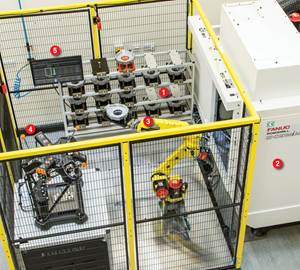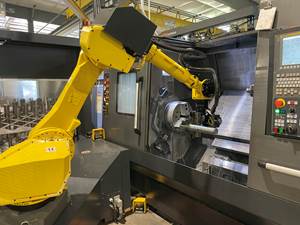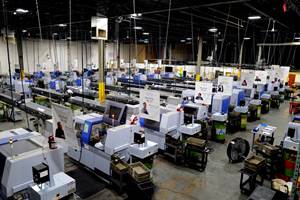Lessons That Matter for the Future of Automated Job Shops
The Automated Shop Conference (TASC, August 12–13) is designed for job shop leaders looking to implement automation in practical, high-impact ways — from lights-out machining to AI-driven programming and front-office integration. Here are 10 standout sessions led by shop owners, engineers and innovators who are pushing automation forward without massive budgets or unrealistic expectations.
Share





A reckoning is taking place at smaller job shops — the family-owned businesses that often lack the capital and internal resources to deploy high-end automation solutions. These shops, usually by necessity, rely on creativity, tribal knowledge and practicality to manage or improve shopfloor operations. But it seems clear that new technologies powered by artificial intelligence are driving automation in a way that we at Modern Machine Shop haven’t seen since the widespread adoption of CNC in the 1970s and ’80s.
This explosive change is why we created (August 12–13 in downtown Indianapolis), which features programming specifically for smaller or medium-sized shops. We believe that the future of jobs shops will not be defined by the biggest or most expensive tools and tech, but by the smartest applications of automation. Practical applications for CNC automation, robotics, digital integration and even front-office systems are why this technical conference exists. If you are an owner, leader or operator at a small- or medium-sized job shop, TASC was designed for you.
The 2025 TASC agenda promises practical takeaways from shop owners, automation integrators, software providers and manufacturing technology leaders. With registration now officially open, here are 10 sessions from this year’s agenda that exemplify the mission:
- Accelerating CNC Programming with Artificial Intelligence
CloudNC CEO Theo Saville will showcase how AI-driven CAM tools — already in use at hundreds of U.S. shops — are streamlining toolpath creation. As the opening session, this promises to demonstrate that AI is no longer on the horizon, it is here now and already reducing programming time and improving consistency.
- Extending Lights-Out Production into the Weekend
Robert McCrory from will share how the shop expanded lights-out machining into the weekend through methodical but practical approaches. The presentation will cover everything from tooling strategies to workholding improvements that allowed for unattended, multipart production over extended weekend shifts.
- Automation in High-Mix CNC Environments
Here’s a big challenge many job shops face: frequent changeovers and variable part runs. Nick Tonti from will show how the company tackled this challenge and offer a framework for evaluating and implementing robotic automation in unpredictable production environments.
- Automating the Front Office Delivers Gains on the Shop Floor
ProShop ERP and Olson Custom Designs are teaming up to explore how front-end digital automation — from job review to inventory planning — can dramatically improve downstream machining performance. This session should serve as a valuable reminder that not all automation requires a robot.
- Icon-Based Programming Cuts Automation Complexity
Jason Reeves from , a key player in the field of industrial and aerospace automation, will detail how low-code, visual interfaces helped streamline robotic programming, refocus their workforce on new skills and even improve organization of robotic program versions. If your shop is short on programming talent, this session is for you.
- Bringing Automation into a Prototyping Shop
Brian Kippen of KAD Models will explain how automation doesn’t have to wait for high-volume production. His team created a palletized automation strategy that enabled lights-out machining at a prototyping shop, then took full advantage of the capability by reorganizing their production floor.
- Designing for Infinite Possibilities: How Fusion 360 Configuration Tables Automate Rotor and Pattern Production
Don’t be intimidated by the long title: Kelly Strzok of will share how her team uses parametric CAD/CAM automation to eliminate repetitive tasks, accelerate production cycles and maintain design consistency. This session will show how job shops can use off-the-shelf software like Fusion 360 to turn variability into a strategic advantage.
- Process Control for Machine Tools and Industrial Robots
Robots and machine tools side by side. It’s a familiar dance, but how do they maintain harmony? Renishaw and will show how practical calibration and process control strategies can enhance accuracy and stability in automated cells — particularly critical for dancing in the dark.
- Are We Facing a Skills Gap — or a Productivity Gap?
If AI is the new frontier, then Al Whatmough is a frontiersman. In this session, the CEO will reframe the workforce conversation. Rather than chasing after traditional skillsets, this session offers a different suggestion: Empowering people through smarter workflows and tools. What new roles are emerging, and what skills will matter in tomorrow’s shops?
- Artificial Intelligence in CNC Machining: Real-World Strategies and Results
TASC’s grand finale session will bring together three of the most forward-thinking leaders in AI for metalworking. We’ve gathered the leaders from CloudNC, MachineMetrics and Toolpath Labs to appear on one stage to provide a comprehensive view of how AI is transforming production and decision-making. This will be an interactive session and a rare chance to interact with leaders who are driving AI adoption in machine shops.
What all of this year’s TASC sessions have in common is that the lessons and strategies being offered aren’t hypothetical. Investigating robotics, rethinking your ERP, digitizing tool management and simply trying to make a machine run for more hours per week is achievable. TASC was designed to offer real-world solutions from and for shops just like yours.
In a moment when automation is no longer a nice-to-have but a competitive necessity, TASC provides a rare opportunity to step back, see what’s working across the industry, and return to the shop floor with specific ideas you can implement. If you’re looking for a shortcut to smarter machining — not just faster, but more resilient and more profitable — this is the conference to attend.
[Note: Early-bird registration discount ends July 11. Click to register.]
Related Content
5 Stages of a Closed-Loop CNC Machining Cell
Controlling variability in a closed-loop manufacturing process requires inspection data collected before, during and immediately after machining — and a means to act on that data in real time. Here’s one system that accomplishes this.
Read MoreSame Headcount, Double the Sales: Successful Job Shop Automation
Doubling sales requires more than just robots. Pro Products’ staff works in tandem with robots, performing inspection and other value-added activities.
Read More3 Ways Artificial Intelligence Will Revolutionize Machine Shops
AI will become a tool to increase productivity in the same way that robotics has.
Read MoreInside the Premium Machine Shop Making Fasteners
AMPG can’t help but take risks — its management doesn’t know how to run machines. But these risks have enabled it to become a runaway success in its market.
Read MoreRead Next
How I Made It: Dennis Rymanowski
Dennis Rymanowski has worked at NSH USA for 60 years, with his passion for manufacturing living alongside his passion for his family’s polka band.
Read MoreA New Frontier in Surface Finish Control
What if your machine tool could measure surface roughness as it cuts? This article explores how in-process metrology is advancing from concept to reality, enabling real-time feedback, immediate detection of anomalies and new levels of control over surface quality. Discover the technologies making this possible.
Read More






















